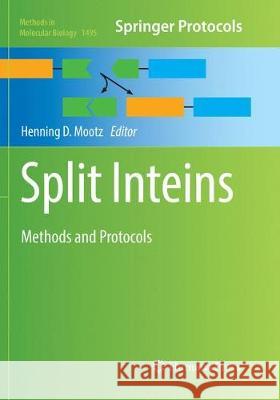Split Inteins: Methods and Protocols » książka
topmenu
Split Inteins: Methods and Protocols
ISBN-13: 9781493982042 / Angielski / Miękka / 2018 / 270 str.
Kategorie:
Kategorie BISAC:
Wydawca:
Humana Press
Seria wydawnicza:
Język:
Angielski
ISBN-13:
9781493982042
Rok wydania:
2018
Wydanie:
Softcover Repri
Ilość stron:
270
Waga:
0.50 kg
Wymiary:
25.4 x 17.78 x 1.52
Oprawa:
Miękka
Wolumenów:
01
Dodatkowe informacje:
Wydanie ilustrowane











